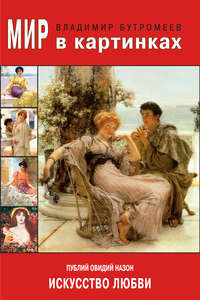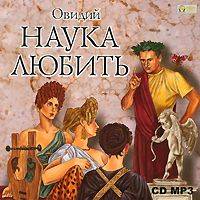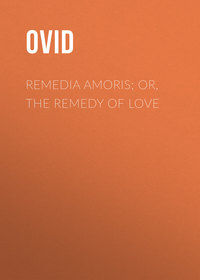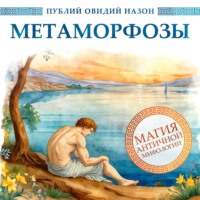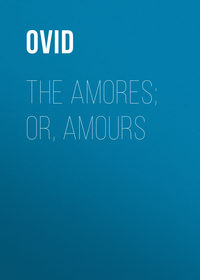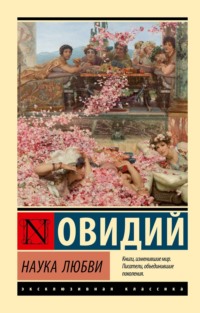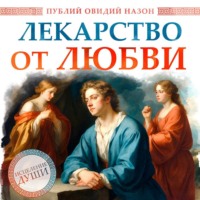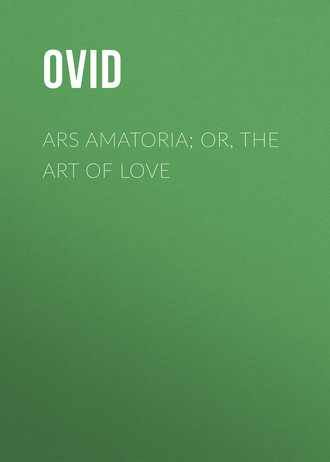 полная версия
полная версияArs Amatoria; or, The Art Of Love
1041 (return)
[ A little treatise.—Ver. 205. He alludes to his book, 'On the care of the Complexion,' of which a fragment remains.]
1042 (return)
[ Of the cesypum.—Ver. 213. The filthy cosmetic called 'cesypum,' was prepared from the wool of those parts of the body where the sheep perspired most; it was much used for embellishing the complexion. Pliny mentions the sheep of Athens as producing the best. It had a strong rank smell. The red colour, which was used by the Roman ladies for giving a bloom to the skin, was prepared from a moss called 'fucus'; from which, in time, all kinds of paint received the name of 'fucus.']
1043 (return)
[ Of the deer.—Ver. 215. Pliny speaks highly of the virtues of stag's marrow. It probably occupied much the same position in estimation, that bear's grease does at the present day.]
1044 (return)
[ Myron.—Ver. 219. There were two sculptors of this name: one a native of Lycia, the other of Eleuthera.]
1045 (return)
[ Beautiful statue.—Ver. 223. He alludes to that of Venus Anadyomene, or rising from the sea, which was made by Praxiteles, and was often copied by the sculptors of Greece and Rome.]
1046 (return)
[ Pierces her arms.—Ver. 240. See a similar passage in the Amores. Book i. El. xiv. 1. 16.]
1047 (return)
[ Toilet in the temple.—Ver. 244. He tells those who have not fine heads of hair, to be as careful in admitting any men to see their toilet, as the devotees of Bona Dea were to keep away all males from her solemnities.]
1048 (return)
[ Sidonian fair.—Ver. 252. Europa was a Phoenician by birth.]
1049 (return)
[ With the clothes.—Ver. 226. See the Amores, Book i. El. iv. 1.48, and the Note.]
1050 (return)
[ With purple stripes.'—Ver. 269. Commentators are at a loss to know what 'tingere virgis' means; some suggest, 'to wear garments with red 'virgæ,' or 'stripes,'while others think that it means 'to tint the skin with fine lines of a purple colour.' It is thought by some that vermilion is here alluded to, while others suppose that the juice of the red flowers, or berries of the 'vaccinium,' is meant.]
1051 (return)
[ The Pharian fish.—Ver. 270. The intestines and dung of the crocodile, 'the Pharian' or 'Egyptian fish,' are here referred to. We learn from Pliny that these substances were used by the females at Rome as a cosmetic, to add to the fairness of the complexion, and to take away freckles from the skin.]
1052 (return)
[ Small pads are suitable.—Ver. 273 'Analectides,' or 'Analectrides,' (the correct reading is doubtful) were pads, or stuffings, of flock, used in cases of high shoulders or prominent shoulder-blades.]
1053 (return)
[ And let the girth.—Ver. 274. He alludes to the 'strophium,' which distantly resembled the stays of the present day, and was a girdle, or belt, worn by women round the breast and over the interior tunic or chemise. From an Epigram of Martial, it seems to have been usually made of leather. Becker thinks that there was a difference between the 'fascia' and the 'strophium.']
1054 (return)
[ At a distance.—Ver. 278. One of the very wisest of his suggestions.]
1055 (return)
[ Umbrian.—Ver. 303. The Umbrians were a people of the Marsi, in the north of Italy. They were noted for their courage, and the rusticity of their manners.]
1056 (return)
[ The son of Sisyphus.—Ver. 313. He here alludes to a scandalous story among the ancients, that Ulysses was the son of Anticlea, by Sisyphus the robber, who had carried her off, and not by Laertes, her husband.]
1057 (return)
[ The wax.—Ver. 314. By the advice of Circe, Ulysses filled the ears of his companions with melted wax, that they might not hear the songs of the Sirens.]
1058 (return)
[ The measures of the Nile.—Ver. 318. These airs were sung by Egyptian girls, with voluptuous attitudes, and were much esteemed by the dissolute Romans. These Egyptian singers were, no doubt, the forerunners of the 'Alme' of Egypt at the present day. The Nautch girls and Bayaderes of the East Indies are a kindred race.]
1059 (return)
[ Plectrum.—Ver. 319. See the Metamorphoses, Book ii. 1. 601, and the Note; also the Epistle of Briseïs, 1. 118, and the Note.]
1060 (return)
[ Thy mother.—Ver. 323. Amphion and Zethuswere the sons of Jupiter and Antiope. Being carried off by her uncle Lycus, Antiope was entrusted to his wife Dirce. When her sons grew up, they fastened Dirce to wild oxen, by which she was tom to pieces. Amphion was said to have built the walls of Thebes by the sound of his lyre.]
1061 (return)
[ Arion.—Ver. 326. See the Fasti, Book ii. 1. 79.]
1062 (return)
[ The festive psaltery.—Ver. 327. Suidas tells us that 'naulium,' or 'nablium,' was a name of the psaltery. Josephus says that it had twelve strings. Strabo remarks that the name was of foreign origin.]
1063 (return)
[ Callimachus.—Ver. 329. See the Amores, Book ii. El. iv. 1. 19: and the Pontic Epistles, Book iv. Ep. xvi. 1. 32, and the Notes of the passages.]
1064 (return)
[ Poet of Cos.—Ver. 330. The poet Philetas. He flourished in the time of Philip and Alexander the Great. Anacreon was a lyric poet of Teios, and a great admirer of the juice of the grape.]
1065 (return)
[ Or him, through whom.—Ver. 332. Some think that he means Menander, from whom Terence borrowed many of his scenes; he probably alludes to the Phormio of Terence, where the old men, Chremes and Demipho, are deceived by Geta, the cunning slave. See the Tristia, Book ii. 1. 359: and 69.]
1066 (return)
[ Propertius.'—Ver. 333. See the Tristia, Book ii. 1. 465, and the Note.]
1067 (return)
[ Tibullus.—Ver. 334. See the Amores, Book iii. EL ix.]
1068 (return)
[ Varro.—Ver. 335. See the Pontic Epistles, Book iv. Ep. xvi. 1. 21; and the Amores, Book i. El. xv. 1. 21, and the Notes to the passages.]
1069 (return)
[ Lofty Rome.—Ver. 338. He refers here to the Æneid of Virgil.]
1070 (return)
[ Two sides.—Ver. 342. Both the males and the females.]
1071 (return)
[ Composition.—Ver. 346. He takes to himself the credit of being the inventor of Epistolary composition.]
1072 (return)
[ Masters of posture.—Ver. 351. These persons, who were also called 'ludii,' or 'histrlones,' required great suppleness of the sides, for the purpose of aptly assuming expressive attitudes; for which reason he calls them 'artifices lateris.' See the First Book, 1. 112; and the Tristia, Book ii, 1. 497, and the Note.]
1073 (return)
[ Which she must call for.—Ver. 356. Probably at the game of 'duodecim seripta,' or 'twelve points,' like our backgammon; sets of three 'tesseræ,' or dice, were used for throwing; he recommends her to learn the game, and to know on what points to enter when taken up, and what throws to call for. See the last Book, 1. 203; and the Tristia, Book ii. 1. 473, and the Note.]
1074 (return)
[ The pieces.—Ver. 357. See the Note to 1. 207, in the last Book.]
1075 (return)
[ The warrior, too.—Ver. 359. He alludes to one of the principal pieces, whose fate depends upon another.]
1076 (return)
[ Let the smooth balls.—Ver. 361. He seems to allude here to a game played by putting marbles (which seems to be the meaning of 'pilæ leves,' 'smooth balls,') into a net with the month open, and then taking them out one by one without moving any of the others.]
1077 (return)
[ Kind of game.—Ver. 363. These two lines do not seem to be connected with the game mentioned in 1. 365, but rather to refer to that mentioned in 1. 355.]
1078 (return)
[ A little table receives.}—Ver. 365. This game is mentioned in the Tristia, Book ii. 1. 481. It seems to resemble the simple game played by schoolboys on the slate, and known among them as tit-tat-to.]
1079 (return)
[ No trusting.—Ver. 377. On account of the continued run of bad luck.]
1080 (return)
[ Flying ball.'—Ver. 380. See the Tristia, Book ii. 1. 485-6, and the Note.]
1081 (return)
[ The Virgin.—Ver. 385. This was near the Campus Martius. See the Fasti, Book i. 1. 464; and the Pontic Epistles, Book i. Ep. viii. 1. 38, and the Note.]
1082 (return)
[ Etrurian.—Ver. 386. The Tiber flowed through ancient Etruria.]
1083 (return)
[ The Virgin.—Ver. 388. He alludes to the heat while the sun is passing through the Constellation Virgo.]
1084 (return)
[ Parætonium.—Ver. 390. See the Amores, Book ii. El. xiii. 1. 7, and the Note. He alludes to the victory of Augustus over Antony and Cleopatra, at Actium; on which the conqueror built the temple of Apollo on the Palatine hill.]
1085 (return)
[ The suter and the wife.—Ver. 391. Livia, the wife, and Octavia, the sister of Augustus, are referred to.]
1086 (return)
[ His son-in-law.—Ver. 392. The allusion is to M. Agrippa, the husband of Julia, the daughter of Augustus; after the defeat of the younger Pompey, Augustus presented him with a naval crown. A Portico built by Augustus was called by his name.]
1087 (return)
[ Memphian heifer.—Ver. 393. See the Amores, Book i. El. viii. 1. 74.]
1088 (return)
[ Frequent the three Theatres.—Ver. 394. He probably alludes to the theatres of Pompey, Balbus, and Marcellus, as they are mentioned by Suetonius as the 'trina theatra.']
1089 (return)
[ Glowing wheels.—Ver. 396. See the Amores, Book iii. El. ii.]
1090 (return)
[ Thamyras.—Ver. 399. He was a Thracian poet, who challenged the Muses to sing, and, according to Homer, was punished with madness. Diodorus Siculus says that he lost his voice, while the Roman poets state that he lost his sight. Amoebeus was a famous lute-player of Athens.]
1091 (return)
[ Of Cos.—Ver. 401. See the Pontic Epistles, Book iv. Ep. i. 1. 29.]
1092 (return)
[ Poets were.—Ver. 405. Euripides was the guest of Archelaüs king of Macedonia, Anacreon of Polycrates king of Samos, and Pindar and Bacchilides of Hiero king of Sicily.]
1093 (return)
[ Placed near to thee.—Ver. 410. According to some accounts, the ashes of Ennius were deposited in the tomb of the Scipios, by the older of his friend Scipio Africanus.]
1094 (return)
[ Its own Priam.—Ver. 440. Priam and Antenor advised that Helen should be restored to Menelaus.]
1095 (return)
[ Liquid nard.—Ver. 443. There were two kinds of nard, the 'foliated,' and the 'spike' nard. It was much esteemed as a perfume by the Romans.]
1096 (return)
[ Narrow belt.—Ver. 444. He probably means a girdle that fitted tightly, and caused the 'toga' to set in many creases. See the Notes to the Fasti, Book v. 1. 675.]
1097 (return)
[ And many a ring.—Ver. 446. 'alter et alter.' Literally, one and another.]
1098 (return)
[ Some thief.—Ver. 447. Among its other refinements, Rome seems to have had its swell mob.]
1099 (return)
[ Thou, Venus—Ver. 451. This temple is referred to in the First Book, 1. 81—87. Its vicinity was much frequented by courtesans.]
1101 (return)
[ You, ye Goddesses.—Ver. 452. He probably alludes to the Nymphs whose statues were near the Appian aqueduct, mentioned in the 81st Une of the First Book. The Delphin Editor absolutely thinks that the 'pro-fessæ,' or courtesans, are themselves alluded to as the 'Appiades Deæ.']
1102 (return)
[ Theseus.—Ver. 457. Who deserted Ariadne.]
1103 (return)
[ Of Inachus.—Ver. 464. Isis, or To. Seo the Metamorphoses, Bk. i.]
1104 (return)
[ To deceive your husbands.—Ver. 484. It is not improbable that 'viros' here means merely 'keepers,' and not 'husbands,' especially as he alludes to their being without the privilege of the 'vitta,' which the matrons wore.]
1105 (return)
[ Two hands.—Ver. 496. He means, that the writing of the lover must be quite erased before she pens her answer on the same tablets.]
1106 (return)
[ Hence, avaunt.—Ver. 505. See the Fasti, Book vi. 1. 696. * Laying aside his foils.—Ver. 515. The 'rudis' was a stick, which soldiers and persons exercising used in mimic combat, probably like our foil or singlestick.]
1107 (return)
[ With Tecmessa.—Ver. 517. She was taken captive by Ajax, and probably had good reason to be sorrowful.]
1108 (return)
[ The twig of vine.—Ver. 527. He alludes to the Centurions, who had the power of inflicting corporal punishment, from which circumstance their badge of office was a vine sapling.]
1109 (return)
[ Nemesis.—Ver. 536. Nemesis was the mistress of Tibullus. See the Amores, Book iii. El. ix. Cynthia was the mistress of Propertius and Lycoris of Gallus.]
1110 (return)
[ Shut your door.—Ver. 587. He addresses the husband, whom he supposes to be wearied with satiety.]
1111 (return)
[ Than even Thais.—Ver. 604. Thais seems to have been a common name with the courtesans of ancient times. Terence, in his Eunuchus, introduces one of that name, who is pretty much of the free and unrestrained character here depicted.]
1112 (return)
[ Lictor's rod.—Ver. 615. This conferred freedom on the slave who was touched with it. See the Fasti, Book vi. 1. 676, and the Note, lie means, that free-born women are worthy to become wives; but 'libertinæ,' or 'freed-women,' are only fit to become 'professæ,' or 'courtesans,' when they may sin with impunity, so far as the laws are concerned.]
1113 (return)
[ Broad girth.—Ver. 622. This seems to be the kind of belt mentioned in line 274.]
1114 (return)
[ Stalk of wetted flax.—Ver. 629. According to the common reading, this will mean that the letter is to be written on blank paper, with a stalk of wetted flax; which writing will afterwards appear, when a black substance is thrown upon it. Heinsius insists that the passage is corrupt, and suggests that 'alumine nitri' is the correct reading; in which case it would mean that alum water is to be used instead of ink. Vessius tells us that alum water, mixed with the juice of the plant 'tithymalum,' was used for the purposes of secret correspondence.]
1115 (return)
[ Good Goddess.—Ver. 637. The debauched Clodius was detected as being present at these rites, in a female dress.]
1116 (return)
[ The false key, too, tells.—Ver. 643. He plays upon the double meaning of the words, 'adultéra clavis,' which properly signifies 'a false key.']
1117 (return)
[ Even though.—Ver. 646. 'Even though you should have to go to the expense of providing the rich wines of Spain for the purpose.']
1118 (return)
[ Even she.—Ver. 663. He alludes to the accommodating lady mentioned in line 641.]
1119 (return)
[ Has she filled.—Ver. 666. See his address to Cypassis, in the Amores, Book ii. El. viii.]
1120 (return)
[ Lemnian dames.—Ver. 672. See the introduction to the Epistle from Hypsipyle to Jason.]
1121 (return)
[ Cephaltis.—Ver. 695. This story is also related in the Seventh Book of the Metamorphoses.]
1122 (return)
[ The quinces.—Ver. 705. These are called 'cydonia,' from Cydon, city of Crete.]
1123 (return)
[ Cyllenian God.—Ver. 725. Cephalus was said to be the son of Mercury; but, according to one account, which is followed by Ovid in the Metamorphoses, Deioneus was his father.]
1124 (return)
[ Her breath.—Ver. 746. See the corresponding passage in the Metamorphoses, Book vii. 1. 861. It was the custom for the nearest relative to catch the breath of the dying person in the mouth.]
1125 (return)
[ With your fingers.—Ver. 755.. Perhaps he means in moderato quantities at a time, and not in whole handfuls. See the Note to the First Book, 1. 577.]
1126 (return)
[ And do not first.—Ver. 757. He seems to irs two precepts here; first, they are not to eat so much at home as to take away all appetite at the banquet, as that would savour of affectation, and be an act of rudeness to the host. On the other hand, he warns them not to stuff as long as they are able, but rather to leave off with an appetite. The passage, however, is hopelessly corrupt, and is capable of other interpretations.]
1127 (return)
[ Perform their duty.—Ver. 764. 'Constent,' literally. 'Will stand together.']
1128 (return)
[ The swans.—Ver. 899. He also alludes to them in the Metamorphoses, as drawing the car of Venus, though that office was more generally assigned by the Poets to doves.]



